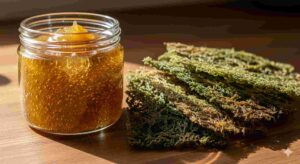
I’ll admit, when I first saw a jar of sea moss sitting on my client’s kitchen counter, I wasn’t sure if it belonged in a smoothie or in a science experiment. My client—eight months pregnant and glowing—swore by it for her energy levels and skin. That got me thinking: can you take sea moss while pregnant? It’s a great question, and one that deserves careful consideration because, let’s face it, pregnancy changes everything—from metabolism to taste buds.
Over the years, I’ve guided many athletes and wellness enthusiasts, and pregnancy introduces a whole new layer of responsibility. So, if you’re curious about whether this trendy superfood fits into your prenatal wellness routine, here’s a clear, practical guide that covers safety, benefits, and tips for getting the most out of it.
What Are the Benefits of Sea Moss During Pregnancy?
Sea moss is often touted as a nutritional powerhouse, and for good reason. Packed with minerals like iodine, calcium, and iron, it can support overall health during pregnancy. I’ve seen clients benefit from its natural boost to energy and recovery, especially when balancing prenatal workouts with the daily demands of growing a tiny human.
Iodine is one of the standout nutrients here. It’s essential for thyroid function, which directly affects metabolism and fetal development. Adequate iodine intake helps maintain hormone balance, supporting both you and your baby. But moderation is key—too much can be counterproductive, which is why understanding dosage is so important.
Another bonus? Sea moss is rich in folate, potassium, and magnesium, nutrients that support cardiovascular health, muscle function, and hydration. During pregnancy, these minerals are especially valuable to help manage swelling, maintain electrolyte balance, and support healthy weight gain.
Are There Any Risks Associated With Taking Sea Moss While Pregnant?

Yes, there are some considerations. Sea moss is natural, but “natural” doesn’t always mean risk-free, especially during pregnancy. One of the main concerns is heavy metal contamination. Because sea moss grows in ocean waters, it can absorb metals like mercury, lead, and arsenic if sourced from polluted areas. Consuming contaminated sea moss could pose a risk to your baby.
Another caution is overconsumption of iodine. While iodine is essential, too much can interfere with thyroid function, which can affect both mother and child. Pregnant women should aim for around 220 micrograms of iodine per day, and you need to factor in prenatal vitamins along with any sea moss you consume.
Lastly, some people experience mild digestive issues, like bloating or diarrhea, when they first start consuming sea moss. Pregnant bodies can be sensitive, so it’s wise to start with a small amount and monitor how your system reacts.
How Can You Safely Include Sea Moss in Your Prenatal Diet?
If you’re convinced about the benefits but cautious about the risks, there are practical steps to make sea moss a safe addition to your diet.

- Choose a reputable source. Look for organic, wild-harvested sea moss that has been tested for heavy metals. Direct-from-harvester brands or trusted health stores are generally more reliable than generic online listings.
- Start small. Begin with a teaspoon of sea moss gel mixed into smoothies or juices. Observe how your body reacts before gradually increasing the serving size.
- Check your iodine intake. Keep track of prenatal vitamins and any fortified foods to ensure you don’t exceed the recommended daily allowance. Consulting your healthcare provider for personalized guidance is the safest approach.
- Incorporate it with other nutrient-rich foods. Pair sea moss with fruits, leafy greens, and protein to maximize absorption and balance. A well-rounded prenatal diet ensures you and your baby get the full spectrum of nutrients.
FAQ: Pregnancy and Sea Moss
Can I take sea moss every day while pregnant?
Daily consumption is possible, but moderation is key. A small serving, like a teaspoon of gel, is generally safe for most pregnant women, provided you monitor iodine intake. Always consult your doctor before making it a routine.
Is sea moss safe in smoothies or cooked meals?
Yes! Blending it into smoothies or adding it to soups can make it easier to digest. Heat may slightly reduce some nutrient levels, but it’s generally fine and can be a delicious way to sneak in minerals.
Can sea moss replace prenatal vitamins?
Not entirely. While sea moss is nutrient-rich, it doesn’t contain all the vitamins and minerals needed for pregnancy, such as DHA or adequate folic acid. Think of it as a supplement to—not a replacement for—your prenatal routine.
Will sea moss help with pregnancy energy or recovery?
Many expectant mothers notice a mild boost in energy due to minerals like magnesium and potassium. It can also support hydration and overall wellness, which may improve recovery after gentle exercise or daily activities.
Pregnant and Feeling Adventurous: My Final Take
So, can you take sea moss while pregnant? The answer is yes—but with caution, research, and moderation. Sea moss can complement a prenatal diet, supporting thyroid function, hydration, and overall nutrient intake, but quality matters more than hype.
Here’s my personal tip: treat sea moss like any other supplement—start small, monitor your response, and always factor in your prenatal vitamins. And enjoy the journey! Pregnancy is the perfect time to experiment with nutrient-dense foods and discover what works best for you and your little one. A small spoonful of sea moss in your smoothie could be your new secret weapon for wellness.


